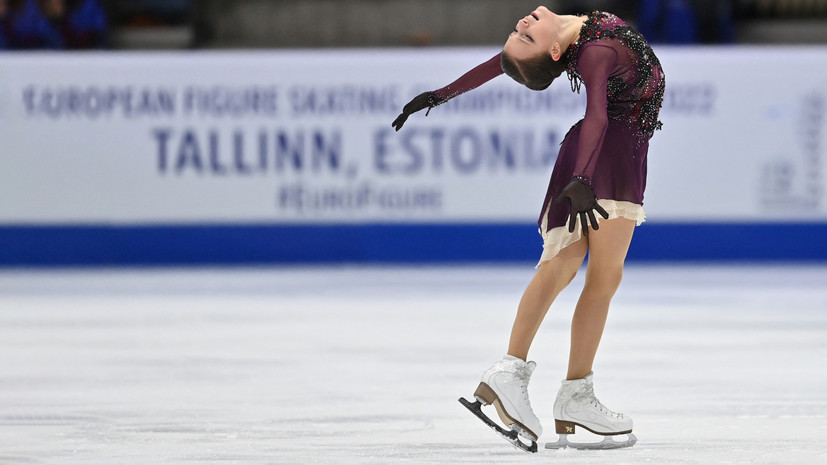In the history of the European Figure Skating Championships, there was only one period when athletes from one country remained undefeated in eight tournaments in a row.
It lasted from 1996 to 2003, when Irina Slutskaya and Maria Butyrskaya alternately replaced each other on the highest step of the podium.
This achievement of Russian skaters was supposed to be repeated last year, but the coronavirus pandemic prevented. In 2014, Yulia Lipnitskaya began a new gold series, after which her compatriots won six more victories in a row. At the same time, only Evgenia Medvedeva managed to win two titles during this period. After that, a new athlete became the champion every time, and now, at the pre-Olympic European Championship in Tallinn, this tradition should have continued.
After the short program, there could hardly be any doubt that the gold would go to Kamila Valieva. The 15-year-old holder of all world records in her discipline entered a triple axel and three quadruple jumps in the free program, intending to compete in her own league, in which there is not a single rival. There was much more intrigue in who would get the silver and bronze medals, for which other Russian skaters still had to compete.
There was enough fear for Anna Shcherbakova, whose unsuccessful performance on the first day of the women's competition provoked a lively discussion among fans and experts. There was talk that the world champion should give up her place in the Olympic team to Elizaveta Tuktamysheva. The European Championships medal could have been armor for the 17-year-old figure skater, but with a gap of seven points behind the Belgian Luna Hendrix and six points behind Alexandra Trusova, it became more difficult to win the award.
Shcherbakova had two trumps up her sleeve.
The first is an unstable quadruple flip, which this season has turned out cleanly twice.
The second is an unbending character, which allowed the skater to emerge victorious from any difficult situation.
Anna used both of them.
She started her performance with an excellent flip, which immediately created a huge backlog in relation to all previous skaters.
Having coped with the starting element, Shcherbakova did not allow herself to fall below the set bar.
She performed each jump with undisguised confidence in her abilities, especially the insidious lutz-rittberger cascade, which let the skater so badly in the short program.
Having finished the program to the end, Shcherbakova was ready to cry with happiness.
With one quadruple jump, she scored 94.10 points only for technique, and for the entire rental she received 168.37 points - the world champion had never had such an assessment at an international start.
In total, student Eteri Tutberidze scored 237.42 points, and with this she removed all questions about her participation in the Olympics.
Only the world record holder scored more this season.
Trusova, who spoke next, clearly wanted to challenge Valieva.
She announced five quadruple jumps for a free program, and she was going to show two lutzes in the second half, including them in the cascades.
At first, she was able to follow her incredibly bold plan.
Trusova also performed a flip, and scored even more points than Shcherbakova, and clearly made a salchow.
But it didn't work out just as well.
The next in line was a quadruple sheepskin coat, and the skater fell on it.
She could not stay on her feet even after the lutz.
More student Tutberidze did not tempt fate and finished the program with combinations of triple jumps, one of which also did not like the judges too much.
The desire to perform as many elements of ultra-si as possible failed Trusova this time.
The base cost of her program exceeded Shcherbakova's by as much as ten points, but in the end, the score for technique was even lower than that of the world champion.
After two rentals, Russian Rocket lost three points to its classmate, two of which she lost just because of falls.
Trusova again had to rely only on a bronze medal.
The fact that Hendrix will not qualify for the awards of the Russians, it turned out pretty quickly.
The Belgian fell twice during the performance, and for the first time she was on the ice after the starting cascade.
She could no longer fight Shcherbakova and Trusova, and the fact that Hendrix, with the worst performance of the season, lost only to them, could be considered real luck.
Valieva completed the European Championship, where for the second time in a row all the gold went to Russian skaters.
She had only to pick up the award of the highest standard.
She started her “Bolero” with an air quadruple salchow, which caused a real delight in the stands.
But then a sigh of disappointment swept through them - Valieva could not cope with the triple axel and fell.
This oversight did not bring down the mood of the 15-year-old skater, and she performed the quadruple sheepskin coat twice more, so that no one would doubt the fairness of her victory.
Valieva in the free program won only 0.24 points over Shcherbakova, but the stock of short skate was enough to have a total advantage of more than 20 points.
So Valieva won her most important tournament in her career so far.

